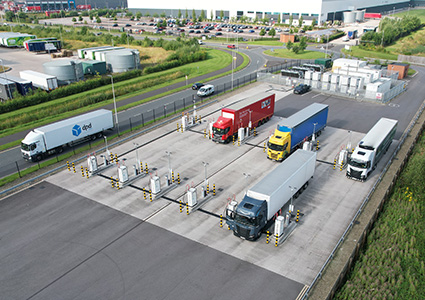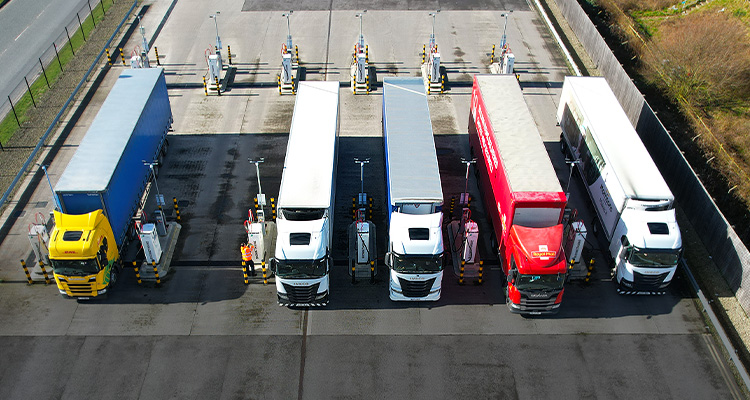Through CNG Fuels’ growing station network, refueling with biomethane has never been easier
Backed by major players in the transport and logistics sector, CNG Fuels is paving the way toward a more sustainable future. As Business Development and Sales Director, Peter Eaton, begins: “We are proud to be the UK’s top provider of CNG refueling infrastructure and 100 percent renewable and sustainable compressed biomethane.
“Today, we work closely with companies such as GXO, DHL, Amazon, Lidl, Royal Mail, Aldi, and Tesco to support their sustainable fuel transition. In the long term, our goal is to roll-out a nationwide network of convenient and reliable refueling stations for heavy duty fleets.”
With national reach and cutting-edge infrastructure, CNG ensures that smart, sustainable solutions are well within reach. As Peter discusses: “We provide 100 percent renewable biomethane to transport companies across the UK. The fuel product, known as Bio-CNG, is composed of biomethane, which we typically source from waste products such as food and manure. The materials are independently verified and approved by the Department of Transport’s Renewable Transport Fuel Obligation and distributed throughout our network.
percent renewable biomethane to transport companies across the UK. The fuel product, known as Bio-CNG, is composed of biomethane, which we typically source from waste products such as food and manure. The materials are independently verified and approved by the Department of Transport’s Renewable Transport Fuel Obligation and distributed throughout our network.
“The way we supply this fuel to our customers comes in two different formats. Primarily, our customers will come to one of the company’s Publicly Accessible Bio-CNG Stations, where they can refuel their trucks with biomethane. Our stations can refuel up to 14 trucks simultaneously, and up to 800 trucks per day. They are specifically engineered for mass adoption in locations with high volumes of HGV placement or passing traffic.
“The other option for refueling is directly on customer sites, via our Mobile Refueling Stations. These are versatile, trailer-based solutions designed to dispense fuel wherever our customers need it.
“With the flexibility to be swiftly mobilized, our mobile units can be commissioned within hours and be relocated to an alternative site if needed. Fuel for these units is sourced in-house, drawn from our Bio-CNG stations, and transported in our dedicated Compressed Natural Gas trailers to ensure a seamless and uninterrupted supply.
“Our newly opened Livingston Station is our sixteenth Bio-CNG Station to become operational in the UK, and it’s available to all current and future customers. The station can be accessed from both Junctions 3 and 3A of the M8 and is ideally situated to serve large local HGV fleets. It also provides an excellent location for passing traffic to refuel with Bio-CNG.
“The Livingston station can refuel 14 trucks simultaneously when at full utilization. That enables more than 600 trucks to be refueled per day, with a total annual capacity of 20 million kilograms of Bio-CNG.
“There are 15 additional Public Access BioCNG Refueling stations in operation to date. Our other locations include Warrington, Avonmouth, Bellshill, Leyland, Erdington, Birmingham, Northampton, Crewe, Newark, Knowsley, Liverpool, Castleford, Newton-Aycliffe, Corby, Bangor, Aylesford, and Doncaster.
“The current main user of the Livingston Station is Tesco, however other users include Aldi, Menzies, Lidl, Evri, and Staples Vegetables. We expect many more companies to start utilizing the site in the future, especially as renewable fuel alternatives continue to rise in popularity.”
Biomethane has a range of advantages over traditional fuels, as Peter affirms. “Not only can customers save 30 to 40 percent in lifetime fuel cost, but they can reduce carbon emissions by up to 90 percent. This is a huge benefit for companies looking to reduce their environmental impact, as adopting biomethane fuel also comes with an accredited certification from the Department for Transport, allowing customers to claim these emissions reductions on respective corporate accounts.

“In addition, our extensive and ever-growing infrastructure makes it easier than ever to refuel with sustainable fuel alternatives. Increased accessibility also means safe and clean refueling. Our stations are user-friendly and don’t require any protective equipment to use. Finally, our fuel ensures a 50 percent noise reduction on all vehicles, leaving drivers less fatigued post-shift.”
This expansive refueling network has done more than skyrocket CNG’s success, it’s also made a tangible difference to the UK’s transport and logistics infrastructure. As Peter details: “CNG Fuels’ investment in Bio-CNG Refueling Infrastructure has allowed a large number of UK companies to make the switch from running their HGVs on diesel, to a renewable and sustainable fuel.
“We now have just over 2100 trucks refueling through our infrastructure daily, which is made up of over 180 individual companies. In 2024, we saved our customers a total of 216,000 tons of greenhouse gas emissions – a truly staggering annual decarbonization figure for the industry.”
From cutting costs to protecting the planet, biomethane fuel is quickly becoming the preferred alternative for future-thinking fleet operators. As Peter asserts: “When it comes to emissions savings, from a well-to-wheel basis, biomethane offers the most practical and cost-efficient way of achieving significant and impactful CO2 reductions for the HGV sector. The CO2 equivalent savings are generally in the region of 80-90 percent, in comparison to a diesel truck of equal size.
“Biomethane is also one of the only fuels that can achieve a net-negative emissions saving, meaning it has the potential to go beyond Net-Zero as a fuel – something we are working on for the future.”
As CNG continues to dominate the UK’s renewable fuel sector, Peter considers what’s to come: “We are currently executing on a business plan that would see us double our Bio-CNG vehicle refueling capacity by the end of 2028. This will enable us to refuel up to 20,000 trucks with Bio-CNG daily.
“Looking further ahead, our target is to refuel ten percent of the UK’s articulated truck fleet with 100 percent sustainable and renewable biomethane by the end of 2030. If we are successful in achieving this, we could help our customers reduce GHG emissions by more than 1.2 million tons per annum,” he concludes.
